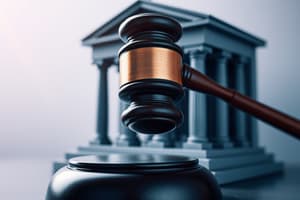Podcast
Questions and Answers
What characterizes crimes of strict liability?
What characterizes crimes of strict liability?
- They require proof of intent.
- They often carry imprisonment as punishment.
- They typically involve driving offences. (correct)
- They carry a social stigma.
What distinguishes excuses from justifications in criminal defences?
What distinguishes excuses from justifications in criminal defences?
- Excuses apply to all circumstances of the crime.
- Justifications admit wrongdoing without offering a defense.
- Justifications deny the act was wrongful in all cases.
- Excuses acknowledge the act as wrongful but lessen the blame. (correct)
Which of the following is NOT a common defence in criminal liability?
Which of the following is NOT a common defence in criminal liability?
- Duress
- Negligence (correct)
- Consent
- Self-defence
What must be demonstrated to rely on a defence in a criminal case?
What must be demonstrated to rely on a defence in a criminal case?
Which element is essential to prove the actus reus in a criminal case?
Which element is essential to prove the actus reus in a criminal case?
In the example of A and B, what aspect is being questioned regarding A's claim of accidental shooting?
In the example of A and B, what aspect is being questioned regarding A's claim of accidental shooting?
What is a legal requirement for a successful claim of self-defence?
What is a legal requirement for a successful claim of self-defence?
What is the significance of the concept of liability in criminal law?
What is the significance of the concept of liability in criminal law?
Who bears the burden of proof regarding the actus reus in a criminal case?
Who bears the burden of proof regarding the actus reus in a criminal case?
What must the prosecution prove in the case of theft?
What must the prosecution prove in the case of theft?
What is the significance of Woolmington v DPP?
What is the significance of Woolmington v DPP?
In a case where self-defense is a possible defense, when does the prosecution have to disprove it?
In a case where self-defense is a possible defense, when does the prosecution have to disprove it?
Regarding mens rea in a criminal case, what must the prosecution establish?
Regarding mens rea in a criminal case, what must the prosecution establish?
What is meant by 'precious court time is not wasted proving the obvious'?
What is meant by 'precious court time is not wasted proving the obvious'?
What is the role of the jury in relation to the prosecution's burden of proof?
What is the role of the jury in relation to the prosecution's burden of proof?
In a case of rape, what must the prosecution prove regarding the actus reus?
In a case of rape, what must the prosecution prove regarding the actus reus?
What is the principle of retribution in criminal law primarily concerned with?
What is the principle of retribution in criminal law primarily concerned with?
Which state of mind indicates an awareness of wrongdoing in criminal law?
Which state of mind indicates an awareness of wrongdoing in criminal law?
What justifies punishment according to utilitarian theorists?
What justifies punishment according to utilitarian theorists?
Which of the following states of mind does NOT require awareness of wrongdoing?
Which of the following states of mind does NOT require awareness of wrongdoing?
Which offense would likely include a fault element that requires no conscious awareness of wrongdoing?
Which offense would likely include a fault element that requires no conscious awareness of wrongdoing?
Which of the following does NOT reflect a blameworthy state of mind?
Which of the following does NOT reflect a blameworthy state of mind?
What describes the relationship between mens rea and punishment?
What describes the relationship between mens rea and punishment?
In the context of criminal law, which of the following best defines 'recklessness'?
In the context of criminal law, which of the following best defines 'recklessness'?
What is the actus reus in criminal law?
What is the actus reus in criminal law?
Which of the following best describes the mens rea?
Which of the following best describes the mens rea?
What does the Latin maxim 'actus non facit reum nisi mens sit rea' imply?
What does the Latin maxim 'actus non facit reum nisi mens sit rea' imply?
Which sequence of questions should be asked when analyzing a case in criminal law?
Which sequence of questions should be asked when analyzing a case in criminal law?
Which of the following is NOT typically considered a prohibited conduct?
Which of the following is NOT typically considered a prohibited conduct?
What is required for criminal liability to be established?
What is required for criminal liability to be established?
Which of the following actions would NOT fall under the category of actus reus?
Which of the following actions would NOT fall under the category of actus reus?
In the context of criminal law, what can be inferred about the 'absence of defence'?
In the context of criminal law, what can be inferred about the 'absence of defence'?
Flashcards are hidden until you start studying
Study Notes
Understanding Criminal Liability
-
Criminal liability is composed of three core elements: prohibited conduct (actus reus), mental element (mens rea), and the absence of any defenses.
-
Actus reus refers to the physical act or omission prohibited by law.
-
This can involve actions like theft, assault, or even failing to act when legally obligated.
-
Mens rea refers to the mental state of the accused, which must be present for an act to be considered criminal.
-
Common examples of mens rea include intention, recklessness, knowledge, and dishonesty.
The Principle of Retribution
-
Retribution is a key ethical principle in criminal law, meaning that punishment should only be applied when the offender deserves it.
-
The latin maxim "actus non facit reum nisi mens sit rea" translates to "an act does not make a person guilty unless there is a guilty mind".
-
Basically, this means someone must have acted with criminal intent for their actions to be considered criminal offenses.
Mens Rea and Punishment
- Mens rea refers to the mental state of the accused, demonstrating their conscious awareness of their actions.
- Individuals who commit offenses intentionally, recklessly, or knowingly are considered blameworthy, as they consciously disregard legal norms.
Justification for Punishment
- Besides retribution, prevention also plays a role in justifying punishment.
- Utilitarian theorists argue that punishment can deter future criminal activity, serving as a preventive function for antisocial behavior.
Crimes of Strict Liability
- Some crimes are considered crimes of strict liability.
- These crimes do not require any mental element on the part of the offender.
- For instance, many driving offenses fall into this category.
Criminal Defenses
-
Criminal defenses can prevent liability even when the actus reus and mens rea elements are met.
-
Excuses are defenses that acknowledge the wrongful act but argue that the offender should not be held liable due to mitigating circumstances, such as insanity or duress.
-
Justifications occur when an act is considered lawful due to specific circumstances, such as self-defense.
Proving Elements of the Offense
-
The prosecution bears the burden of proof for all elements of a crime, including the actus reus, mens rea, and disproving any potential defenses.
-
This means the prosecution must prove beyond a reasonable doubt that the accused committed the prohibited act with the requisite mental state and that no valid defense exists.
-
The accused does not need to prove their innocence; they are presumed innocent until proven guilty.
Burden of Proof for Defenses
-
The prosecution does not need to disprove every possible defense, but only those for which the accused presents credible evidence supporting their claim.
-
The defense bears the burden of producing evidence to support the potential defense, which allows the courts to prioritize their time and resources on credible arguments.
Studying That Suits You
Use AI to generate personalized quizzes and flashcards to suit your learning preferences.



